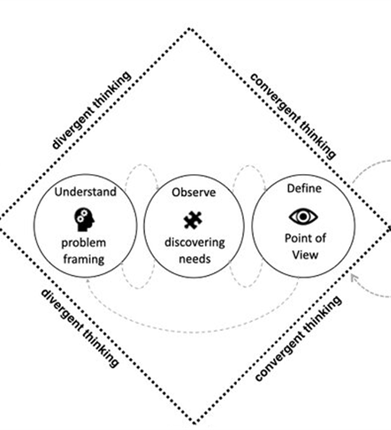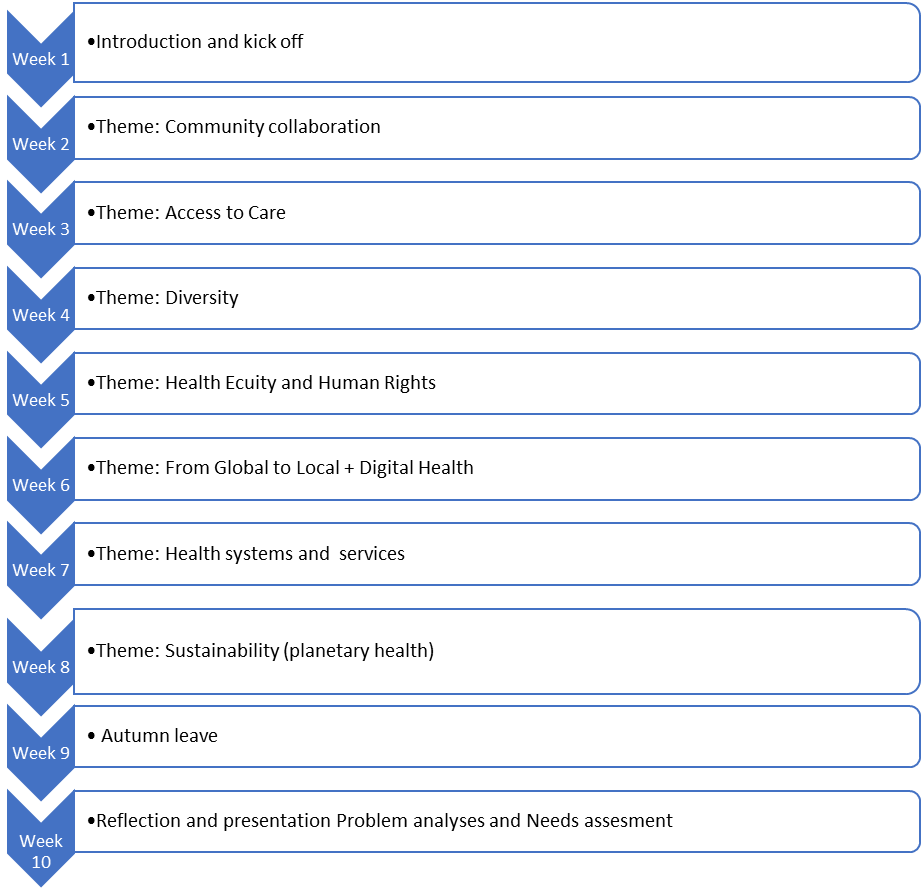Global Health Theory
The Global Community Health team welcomes you to this minor. In today's interconnected world, the health of people and communities is increasingly influenced by a complex web of factors extending beyond individual hospital care. The Minor in Global and Community Health provides an interdisciplinary education that empowers you to address complex health challenges by working in and with the community.
In our society, factors such as economic stability, education, environment and community cohesion – known as social determinants of health – play a significant role in shaping health differences. For instance, food deserts in urban areas limit access to nutritious food, contributing to higher rates of obesity and chronic diseases. Addressing these issues requires a comprehensive understanding of health equity, embracing the diversity of our communities and ensuring that all individuals, regardless of their background, have the opportunity to achieve their highest level of health. Culturally competent health professionals are able to look at their own positionality, really engage with people and increase trust in the health system.
There are many factors influencing access to care, with barriers such as cost, transportation, and lack of information preventing many from receiving or accepting the care they need. The health system must adapt and really involve people, improving health literacy, using social media in a positive way to enhance health education and advocacy, enabling widespread dissemination of information and mobilizing community action. Rising temperatures and extreme weather events can lead to health crises such as heat-related illnesses, respiratory problems, and the spread of vector-borne diseases. By integrating sustainability into health practices, you learn to develop and promote environmentally friendly healthcare solutions, such as reducing the carbon footprint of healthcare facilities and advocating for policies that mitigate the effects of climate change.
During the Minor in Global and Community Health we discuss with you to take a step out of your comfort zone to collaborate with the community to explore the community needs and to develop a community intervention.
Leerdoelen
After completing the minor Global Community Health you will be able to:
-
Explore the diversity and needs of different communities to reach health equity and social justice, explain the role of the different determinants of health.
-
Analyse access to care of the community as well as health care providers perspective using a holistic biopsychosocial and positive health approach.
-
Communicate and collaborate effectively with the community (involvement, engagement and empowerment) in multi-disciplinary, intersectoral, and multi-cultural settings.
-
Develop and evaluate long-lasting effective evidence-based and community-centered health interventions.
-
Critically self-reflect on positionality and personal/ professional development in health care and community settings.
-
Explain your own role as a change agent in providing sustainable environmental and planetary health.
Ingangseisen
Students must meet the minimum requirement for study points and have received permission from their own school to attend the minor program.
Literatuur
Material like scientific articles, videos and websites are used and offered by the lecturers and needed to prepare classes.
Rooster
Our program consists of 10 weeks theory in Amsterdam. Classes are every Monday, Tuesday and Thursday. There is also designated time within which students will be working in/with the community.
Full time minor. Classes are scheduled on Monday, Tuesday and Thursday.
Contact Time
· Lectures and tutorials: 120 hours
· Coaching / Consultancy: 10 hours
· Self-Study Time
· Designated working time in the community
· Exams: 8 hours
· Fulltime Minor
Toetsing
The global community health minor consists of one parts of 10 weeks.
Global Community Health Theory
During the first ten weeks you will be provided with themes and theoretical concepts related to Global Health issues. You will be invited to put these concepts into action supported by games, debates, brainstorms and discussions. Each week focuses on a specific theme (figure 1) related to global community health: you will gain knowledge that will help you to become aware and better understand the complexity of global community health.
Global Community Needs
Also, you will acquire tools and skills to be able to perform an interesting Global Health project within a community in Amsterdam. What knowledge and skills do you need to be able to work with a community that, for example, has another cultural background, doesn’t speak your language very well, has different norms and values, maybe has low health literacy etc. In these projects you will explore and analyze the context of a societal challenge related to health and will perform a problem and needs analysis with the specific community. You will talk to community members, to other stakeholders involved in the societal challenge/ health problem and also weekly to experts from the field of global community health and experts by experience.
Together with the community members and other stakeholders, you and your project team will explore what their problem(s) and need(s) is/are. You will discover challenges/problems that they experience.
Community Needs: First 10 weeks

Weekly Themes:
As mentioned earlier, each week focuses on a specific theme related to Global Health Issues and will support you with your project work in the community.
The themes are visualized in the schedule below (fig. 1).

Program Structure
You will follow a fixed weekly rhythm throughout the minor. As you can see in the schedule below, every day of the week has a set content, except for the first (kick of) and last week (assessment) of ‘Community Needs’.
The weeks are divided into Global Health related themes.
Weekly rhythm ‘Global Community Needs and Theory’
Every Monday the theme of this specific week will be introduced in a so called ‘Deep Dive’ session. During this session you will receive in-depth information about a specific topic. This information will support you and your team in your work in and with the community. Moreover, it will raise your awareness concerning the complexity of working in the field of global health. After this deep dive another meeting is scheduled in which you will gain knowledge and skills about the design thinking process. These meetings will support you and your team and guide you step by step through the process and design of your global health project.
Every Tuesday, information gained during the Deep Dive sessions will be put into action.
Active working methods will be offered to be able to apply the theory into action in order to support you in your project work.
During these sessions you will also be equipped with tools to develop your personal and professional growth.
In the afternoon, some groups will receive coaching and will be guided in the design thinking process.
Wednesday you have time to work on your project and meet the community and other stakeholders
Every Thursday experts from the field are invited to share their expertise and experiences regarding working in and with communities. These meetings are valuable, instructive and relevant for your work in the community and thus for your project assignment.
After this session there will be a moment of reflection: What are your lessons learned this week, what can we learn from each other and what will be your goals for next week?
In the afternoon, some groups will receive coaching and will be guided in the design thinking proces.
Fridays you have time to work on your project and meet the community and other stakeholders
Monday:
Deep Dive into new Global Health Theme
Design Thinking Community project
Tuesday:
Theory in action (Activity / game related to week theme)
Professional development (Coaching on professional development related to working in the field of Global Health)
Self-reflection
Working in the community /self study
Wednesday:
Self study
Working in the community /self study
Thursday:
In conversation with the community Stakeholder/ Community member/ partner
Week wrap up (read threat of topics related to week theme and Sharing ideas, progress, pitfalls and experiences)
Working in the community /self study
Friday:
Self study
Testing and Assessments
15 ECTS:
Global Community Health Theory - Creative Assignement (6 ECTS)
Global Community Needs - Group Assignment Presentation & Individual Reflection report (9 ECTS)
Please Note: If you are interested in doing both ‘Global Community Health Theory, Global Community Needs’ and ‘Global Community Interventions’ you need to subscribe to: Minor Global Health Theory and Fieldwork - 30 ECTS
If a student fails to successfully complete the minor in the period in which she took the minor it is possible to finalize the minor in a following period in which the minor is given.
If a minor is no longer offered or in case the minor is rewritten, the degree programme will offer students a further two opportunities to finalize this minor in the following year.
Aanvullende informatie
Didactic Methods
In Global Health Theory students will take part in lectures and applied tutorials to explore a variety of Global Health issues. The lectures will be delivered by lectures from the AUAS, as well as external expert lectures who are actively working in the field of Global Health. A variety of didactic methods are used throughout the minor including classical lectures, tutorials, group work activities, debates, games, brainstorms and panel discussions.
Questions about de minor?
Contact Annemieke van Heerwaarden, minorglobalhealthfg@hva.nl
Questions about the Kies Op Maat procedure?
Contact Niermela Chote-sobha, n.chote-sobha@hva.nl
Applications will be processed in the order of receipt of signed learning agreements.